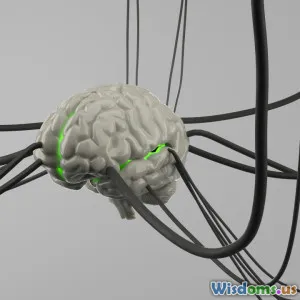
Why Multitasking Makes Your Brain Less Efficient
14 min read Discover how multitasking actually decreases your brain’s efficiency and harms productivity. (0 Reviews)
Why Multitasking Makes Your Brain Less Efficient
We live in an age where juggling multiple demands is so commonplace that it often feels essential. Notifications buzz, emails demand replies, and projects compete for our attention. Many wear multitasking as a badge of productivity, convinced they're achieving more in less time. Yet, neuroscience tells us a strikingly different story: multitasking doesn’t just divide your focus—it actually diminishes your brain’s capabilities. Here's a deep dive into the cognitive science behind why multitasking undermines efficiency and what you can do to reclaim your focus.
The Myth of True Multitasking

Multitasking has become synonymous with efficacy in the digital age. Flick between your inbox, your phone, and your spreadsheet, and surely you're getting more done, right? Not quite.
Research from Stanford University found that people who regularly engage in high media multitasking are actually more easily distracted, have poorer memory retention, and are less able to switch between tasks efficiently [Stanford Study, 2009]. The reason: true simultaneous multitasking—executing more than one high-cognition task at once—is largely a myth. Our brains, instead, engage in fast switching between tasks, a phenomenon cognitive psychologists call "task-switching." Rather than working on two projects at once, your brain shuttles attention rapidly between them, losing focus and efficiency along the way.
Everyday Example
Consider writing an important report while responding to frequent Slack messages. Each time your focus pivots, your brain has to reorient, remind itself of where you left off, and regain momentum. This constant resetting consumes valuable mental resources—and time.
The Cognitive Costs of Task-Switching

When we attempt to multitask, what really happens inside our heads? Task-switching draws upon the brain's executive functions, a set of cognitive skills controlled primarily by the prefrontal cortex. Each switch forces your brain to perform what’s called “goal shifting” (choosing to do one thing instead of another) and “rule activation” (changing focus to follow the new rules of the next task).
Research by the American Psychological Association reports that these shifts can cost as much as 40% of someone's productive time. For complex or unfamiliar tasks, the loss is even greater. The reason is inertia: the brain needs time to re-immerse itself in the context, details, and goals of each activity.
Key Facts:
- It takes an average of 23 minutes and 15 seconds to get back to a task after an interruption (Gloria Mark, University of California, Irvine).
- Frequent switchers report higher levels of mental fatigue and stress.
Perhaps even more concerning, this chronic cognitive overload is linked to an increase in simple errors and lapses in judgment, sometimes leading to serious work or safety mistakes.
Impacts on Memory and Learning

Switching between tasks doesn’t just sap productivity in the short term—it can impair your memory and ability to learn. While you may feel accomplished after handling a rapid-fire email exchange alongside an online training course, studies indicate you comprehend and retain less with each switch.
A 2010 study at the University of California, San Francisco, revealed that multitasking negatively impacts your brain’s hippocampus—the region responsible for learning and forming memories. When bombarded with multiple streams of information, the brain struggles to properly encode and store data, leaving only shallow impressions.
Concrete Example
Students who text while listening to lectures or watching educational videos retain significantly less information and perform poorer on follow-up assessments compared to peers who block out all other distractions. What may feel like high-efficiency learning is, in reality, diluted understanding.
The Illusion of Productivity

Why do so many persist in multitasking if its costs are so steep? The answer lies partly in perception. Multitasking fuels the illusion of productivity—checking more boxes off your to-do list, toggling tabs, replying swiftly to notifications.
This sensation of busyness activates reward centers in the brain, releasing small bursts of dopamine with each “completion.” In the short term, this provides a sense of achievement. However, the end result is frequently superficial: the work lacks depth or quality, and important details are overlooked.
The workplace is not immune to this fallacy. A 2017 Microsoft study found that employees who continually shifted between applications lost up to 28% of their productive time per day, resulting in an often overlooked cost to organizations.
How Multitasking Affects Emotional Well-being

The cognitive toll of multitasking often translates into emotional stress. Bombarded by shifting priorities and unending streams of information, the brain goes into overdrive. This sustained mental strain can contribute to:
- Chronic stress and irritability
- Decision fatigue, lowering judgment over choices large and small
- Burnout (characterized by exhaustion and disengagement)
A telling example is the rise of "technostress"—anxiety and fatigue experienced in response to constant digital connectivity. The Harvard Business Review points out that multitasking, especially with technology, magnifies this stress, undermining resilience and job satisfaction.
Imagine fielding calls, emails, and calendar alerts in an already busy day; the overwhelm is palpable, and, with it, so are mistakes and emotional exhaustion.
Multitasking Versus Deep Work: A Comparison

In sharp contrast to multitasking, the concept of "deep work"—coined by Cal Newport, professor and productivity expert—advocates focusing intently on a single task for extended periods. Deep work cultivates:
- Dense concentration
- Higher quality output
- More creative or analytical breakthroughs
For example, writers and software engineers often report their most innovative work happens in distraction-free, focused sprints. Companies like Google and Microsoft are increasingly encouraging "focus time" for employees. These firms have even rolled back mandatory meetings and added tools that block notifications, allowing for regular bouts of deep work.
Key Differences:
| Multitasking | Deep Work |
|---|---|
| Rapid task-switching | Sustained focus |
| Shallow processing | Deep processing |
| Frequent errors | Higher accuracy |
| Mental fatigue | Cognitive renewal |
Switching from multitasking to deep work doesn't just safeguard context—it makes teams more innovative and less prone to burnout.
The Science Behind Attentional Networks

Why does the brain handle multiple tasks so poorly? It's a matter of how attentional networks are structured. Neuroscientists identify two major modes:
- Focused attention, handling one item
- Diffuse attention, low-level awareness of surroundings
Attempting to run two high-focus tasks (like writing and holding a conversation) overloads focused attention, leading to confusion and mistakes. Trying to sustain high mental energy across both caregivers and cognitive processes is unsustainable, and the networks begin to malfunction.
fMRI studies show that brain regions associated with focused tasks (prefrontal cortex, posterior parietal cortex) quickly lose signal strength with divided attention, so both tasks receive only a fraction of the necessary resources. As a result, the quality of performance drops across the board.
How to Minimize the Downsides of Multitasking

Understanding the pitfalls of multitasking is only useful if we act on it. Here are practical steps for building a brain-friendly workflow and making focus your superpower:
1. Batch Routine Tasks
Schedule similar administrative tasks—like responding to emails or returning phone calls—into pre-designated blocks. This minimizes the need to continually reorient your thoughts.
2. Use "Pomodoro" Sprints
Work in 25-minute increments of uninterrupted focus, followed by a 5-minute reset. This method maximizes attention and prevents fatigue, as shown in productivity research.
3. Eliminate Distractions
Silence notifications, close extra tabs, or use apps like Freedom or Cold Turkey to block known distractions.
4. Prioritize Your To-Do List
Tackle the most cognitively demanding tasks first. As attention wanes over the day, save routine duties for later.
5. Set Boundaries With Technology
Designate set times for checking messages or social networks. Continuous partial attention to devices only trains the brain to crave novelty, reducing your overall focus.
Reclaiming Your Brain's Efficiency in a Distracted World

In a culture obsessed with speed and multitasking, swimming against the tide takes intention. But the rewards are more than worth it: higher-quality work, improved memory and learning, reduced stress, and a genuine sense of accomplishment.
Take inspiration from successful figures who prioritize focus. Steve Jobs famously secluded himself to work intently before launching new Apple products. Olympic athletes retreat from digital distractions to perfect their craft. Even leading scientists schedule "quiet hours" for pure thinking, fostering the slow incubation of big ideas.
Simple Steps Toward Monotasking
- Start each day by choosing one priority project.
- Give yourself permission to shut out the noise, even if only for half an hour.
- Celebrate progress made by depth, not mere activity.
Our brains, marvels of complexity though they are, crave clarity and purpose more than endless multitasking. Whether you're striving for professional greatness or simply peace of mind, reclaim your focus—one single, unwavering task at a time.
Rate the Post
User Reviews
Other posts in Mental Health
Popular Posts


















